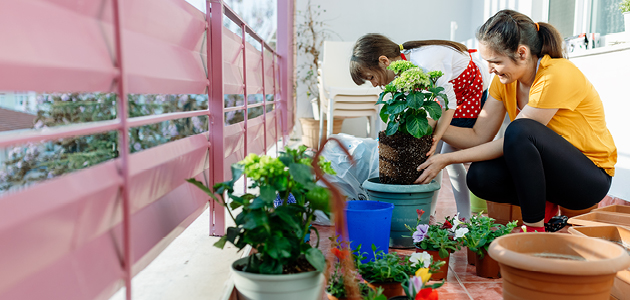The very first Earth Day was celebrated 51 years ago on April 22, 1970. Since then, this movement has been promoting environmental awareness and pushing environmental concerns to the forefront to inspire people around the world to protect our planet and fight for a cleaner, safer and healthier environment.
There are wonderful ways that you and your family can mark Earth Day, but it’s also important to celebrate all year long by making a commitment to living a greener, more sustainable lifestyle.
Celebrate Earth Day
- Plant a tree. Trees and shrubs improve soil and water conservation, store carbon, moderate local climate by providing shade, help regulate temperature extremes, increase wildlife habitat and improve the land’s ability to adapt to climate change.1
- Plan a native flower garden. Choosing plants that are native to your area is a great way to achieve garden success because they’ve evolved over centuries to adapt to changes in their environment and are already primed to thrive. As an added bonus, they provide a habitat and food for important native animals, birds and insects. Visit Dyck Arboretum for tips on planning a native garden, and check with local botanical gardens, conservancies and universities to learn what plants are native to your region.
- Plant a vegetable garden. When you plant your own vegetables, you control everything about the way they grow, including soil, water and avoiding pesticides and other chemicals. Plus, you and your family will enjoy a delicious and healthy harvest throughout the summer and fall. If you’re new to vegetable gardening, visit Gardeners for some great advice to get you started. Even if you don’t have a backyard, you can still grow herbs and some vegetables in containers.
- Clean up local parks and public spaces. Wear gloves and bring trash bags to collect garbage on streets, local parks or beaches. Be careful if you spot potentially dangerous debris, like broken glass. If you find discarded syringes, do not pick them up. Call your local park authority to let them know what you’ve found.
- Learn more about sustainable living. Visit websites like Conserve Energy Future and Expatica to find out more about what it means to live a sustainable life and how to achieve that goal.
Ways to celebrate all year long
- Use up your leftovers. Wasting food contributes to the creation of global greenhouse gas emissions, because unless it’s responsibly composted, the food you toss ends up in landfills. In fact, food in landfills contributes to nearly one-quarter of all methane emissions in the United States,2 and in the UK, food waste is associated with over 10 million tonnes of greenhouse gas emissions.3 Plan your meals in advance to ensure that you only buy what you need. And make sure to eat up those delicious leftovers!
- Buy local. As much as possible, buy food that is grown or raised within 100 miles of your home. Locally grown foods are usually fresher, and the carbon footprint associated with getting them onto your table is also much smaller.
- Leave the car at home. Whenever possible, walk, bike or take public transit to help reduce greenhouse gas emissions and lower your carbon footprint.
- Strive for a zero-waste household. Zero is ideal, but even reducing the amount of waste generated in your home is great. The goal is to keep as much garbage out of landfills, incinerators and the ocean. Cooking at home instead of buying prepared and packaged foods, drinking tap water instead of beverages in plastic bottles, using reusable cloth shopping bags, using bar soap instead of liquid soap in plastic bottles, shopping secondhand and composting your scraps are all wonderful ways to reduce trash. For more tips on zero-waste living, visit Wellness Mama and Leafeco.
- Conserve water and energy. Consider switching to water-efficient showerheads, checking taps and toilets for leaks, turning the water off when brushing your teeth and shaving, taking shorter showers, turning off all unnecessary lights, unplugging unused electronics, washing only full loads of dishes and clothes, and air-drying clothes on a line. There are so many simple ways to conserve at home!
This planet is our home, so it’s in our best interest to make sure that we protect it so that we can leave a cleaner, healthier and safer world to our children and grandchildren. For more information on Earth Day and what you can do to help protect the environment, including special activities planned for April 22, 2021, visit EarthDay.org.
SOURCES
1 https://www.lsrca.on.ca/Pages/Top-5-Benefits-of-Trees.aspx
2 http://www.gulfcoastnewstoday.com/stories/top-3-reasons-not-to-waste-food,38033
3 https://www.geneco.uk.com/Facts_about_food_waste/
419757 CAN/US (04/21)


